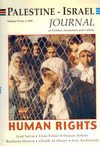Editorial
An examination of the human-rights situation in the world reveals
that organizations dedicated to the defense of human rights are
able to function freely only in democratic societies. In countries
subjected to dictatorial regimes, where the watchfulness of
human-rights activists is most needed, they are often persecuted
and imprisoned in order to silence them. However, even in
democratic states, proud of the rule of law and of their
independent judiciary system, the protection of minority rights and
of the individual's freedom to oppose national consensus should not
always be taken for granted.
Governments and public opinion are frequently more sensitive to
human¬rights violations abroad than to those committed in
their own country. Thus in the 1970s and 1980s, British public
opinion was very much concerned with Israel's systematic violations
of Palestinian rights and freedoms, while being much less upset by
the brutal persecution of Irish nationalists in Ulster, meted out
by Brit
read more ...
